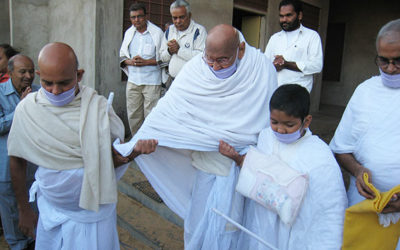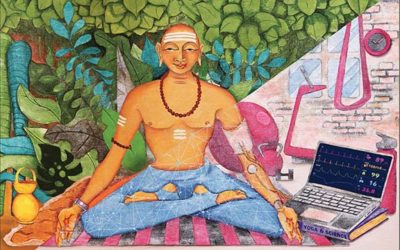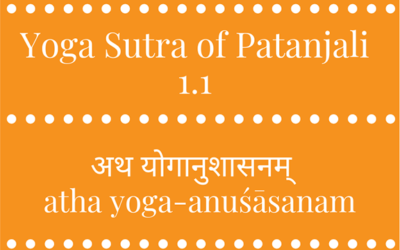One year ago I was diagnosed with fibromyalgia, a disorder that affects the way my brain/nervous system processes pain. It all started in 2020, while I was finishing my Intermediate Integral Yoga Teacher Training online. Over the course of several months, the pain...
Questions and Answers on the Yamas
Q: In the Ramayana and Mahabharata, it’s clear that there was killing. The Gita itself takes place on a battlefield. How is this explained and justified in terms of ahimsa (non-violence)? Swami Satchidananda: In the Bhagavad Gita, Krishna talks about non‑violence to...
The Origin Story of Integral Yoga Japan (Hiroshima)
I’d like to share with you the story of how I decided to start Integral Yoga Japan in Hiroshima. There was a lady in Japan who was undergoing a lot of physical and mental challenges. She wrote to Satchidananda Ashram–Yogaville to ask for help and guidance. Swami...
Spiritual Independence
Independence implies a freedom from being controlled or unduly influenced by an outside source. Spiritual independence suggests the freedom to live in harmony with the spiritual truth at the heart of our being. It implies freedom from depending on any outside source...
Can the Yoga Sutras Bestow Power?
Observing how Yoga has changed the world, I cannot help but wonder how the world has changed Yoga. As the plethora of Yoga studios and communities formed, they focused mainly on serving the physical body. The calling was great; strengthen and balance the body—that is...
A Nondual Approach to the Niyamas
Retaining what we’ve learned about the yamas, we now train our attention on the niyamas which occur in sutra 2.32. When prefixed to a noun “ni” can be a negation. It also means “down, back, in, into, within.” Thus, niyama is traditionally rendered “observances”...
Light on the Yamas & Niyamas: Aparigraha, More than Non-Stealing
We’ve come to the final yama (in the five yamas of the Yoga Sutras of Patanjali) and the last occurrence of Patanjali’s “via negativa” approach. Aparigraha, commonly referred to as “non-grasping,” is composed of graha (seizing) with two prefixes attached: a (not) and...
Light on the Yamas & Niyamas—Satya: What About Truth?
Satya, truth, stands second in Patanjali’s list of virtues or “restraints.” Most often rendered with respect to speech, like ahimsa, satya broadens to include thought and deed. Under the rubric of ahimsa, the commentators advocate that truth not be spoken unkindly,...
Living Yoga in a Busy World: My Dog is my Spirit Guide
In this new column for Integral Yoga Magazine, "Gita in the Garden, Living Yoga in a Busy World," Yoga teacher Gita Brown shares her reflections on, well, living your Yoga. In each installment, she will share what her Yoga study and practice has revealed to her about...
Light on the Yamas & Niyamas: Awakening to Ahimsa
In this column, Rev. Dale Ann Gray offers reflections on the yamas and niyamas of the Yoga Sutras, incorporating insights from classical Nondual Yoga. In this article, she unpacks the first yama, ahimsa (non-violence, non-harming). In the Yoga Sutras of Patanjali,...
Raja Yoga’s Essential Teaching: The Quest for Happiness
In this 3rd installment of this series on "Raja Yoga Now," Swami Karunananda encourages our readers to explore what they are truly searching for in life. And, to consider how the teachings of Raja Yoga can support one's inner exploration and spiritual journey. What do...
Light on the Yamas & Niyamas: Introduction
In this new column, Dale Ann Gray offers reflections on the yamas and niyamas of the Yoga Sutras, incorporating insights from classical Nondual Yoga. In this article, she offers an overview on the distinctions between the dualistic philosophy of Patanjali’s Yoga and...
The Science of Yoga, Part 1: Yogabhyasa and Yogavidya
The practice of Yoga and the science of Yoga, or Yogabhyasa and Yogavidya, are two of the traditional ways that Yoga is described. Yoga is a practice (abhyasa) and a science (vidya). While asanas and pranayama are immensely popular and currently the most visible...
Raja Yoga Now: The Beginning
The Yoga Sutras of Patanjali begins with a call that reverberates through the ages: Atha Yoganusasanam: Now the exposition of Yoga is being made. It is an invitation to seekers of truth everywhere, irrespective of place, time or circumstance. It offers a universal...
Raja Yoga Now: The Master’s Touch
It was in September 1970 that I first met my spiritual master. It was a time when many great Gurus were being drawn to the West, attracted by the awakening aspiration of the youth. Several hundred of us had gathered at a rustic site in the mountains of California for...
The Psychology of the Yoga Sutras
The late Michael Stone understood that we all crave to forget about ourselves and to connect with something larger than the way we represent ourselves, yet, we constantly put obstacles in our own way. That’s why we need Yoga, and it’s also why we need to approach Yoga...
















